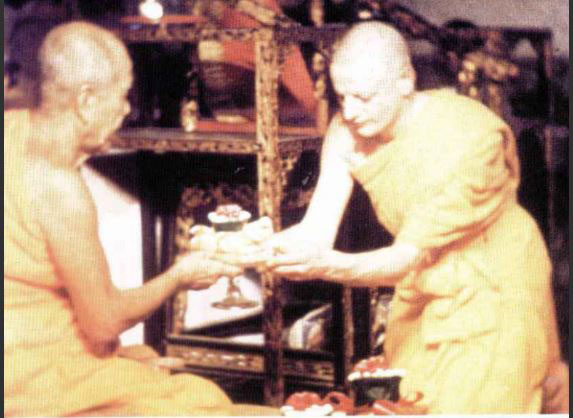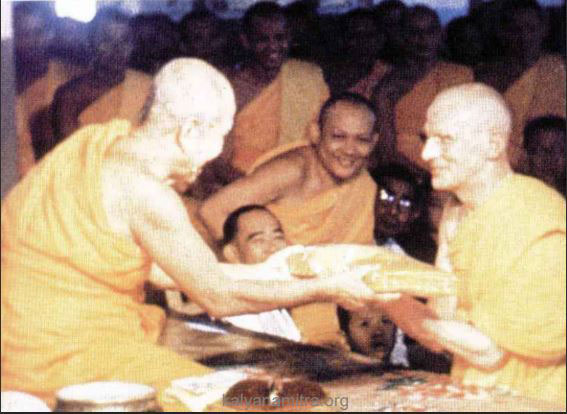
Although Luangpu had never undergone any training in management, his management skills were second to none. He used the Dhamma of the Buddha as his guide in managing people. And he practiced what he preached.
Luangpu's management style was one of a father to his children. He applied Brahmavihara-the "Four Divine States of Mind"-consisting of loving-kindness, compassion, sympathetic joy, and equanimity in managing his temple residents. He gave everyone genuine love and equal treatment as if they were his own sons and daughters. He worked hard for their wel fare, making sure all of them were well provided for. He shared everything he had with them so that they could live happily just like they were still living at home with their parents. He gave them plenty of love and care, but when it came to discipline and behavior he was quite strict.
One of the most challenging aspects in temple management is to make sure that every temple resident follows his or her appropriate Precepts. Precepts are codes of moral conduct practiced by all Buddhists. Buddhist Precepts are divided into two groups: one for house holders and one for monastics.
The aim for monastic practice is to overcome the weaknesses in one's character and to eradicate defilements. The lifestyle of an ordained monk is one that requires intense discipline, will-power, and perseverance in order to achieve the ultimate goal of deliverance. The purposes of monastic discipline are to establish good moral foundation for ordained monks, provide harmony and happiness for the monastic community, gain faith and confidence of the public, and preserve the longevity of Buddhism.

The core practice for all Buddhist householders' moral conduct is the Five Precepts1 (1The Five Precepts consist of: not killing living beings; not stealing; not committing sexual misconduct; not lying; not consuming alcohol or other intoxicating substances). For some Buddhists who wish to intensify self-purification, they practice the Eight Precepts2 (2The Eight Precepts consist of: not killing living beings; not stealing; not engaging in any sexual activities; not lying; not consuming alcohol or other intoxicating substances; not taking meals between midday and dawn; not indulging in entertainment or shows that impede the quality of mind and not to be immodest in the way of dress or behavior, not indulging in indolent sleeping habits that may lead to sensuality or laziness (such as sleeping on high, soft, luxurious beds). The purposes of the last three rules are to deter any sexual inclination which may impede one's ability to purify the mind.), the expansion of the Five Precepts. The goal is for cleansing the defiled mind resulting in inner calm and joy. Nuns and resident laypeople follow the Eight Precepts. A novice monk practices the Ten Precepts3 (3The Ten Precepts consist of: not killing living beings; not stealing; not engaging in unchaste activities; not lying; not consuming alcohol and any intoxicating substances; not taking meals between midday and dawn; refraining from singing, dancing, playing music, or attending entertainment performances; refraining from wearing perfume, cosmetics and decorative accessories; refraining from indolent sitting and sleeping habits (i.c., sitting on highly cushioned chairs, or sleeping on luxurious, soft beds); and refraining from accepting and dealing with money). A fully ordained Buddhist monk follows an intensive set of discipline known as the 227 Precepts, which are to be kept on a daily basis.
Buddhist monks are expected to lead a life of perfect purity, setting good examples for all Buddhists. A monk's behavior is a reflection of his temple and the religion. Luangpu made sure that all the monks at his temple follow the monastic disciplines rigorously and all temple residents live by the temple rules. This was no easy task as the number of temple residents grew bigger by the day.
He divided management responsibilities into three areas: one for academic studies; one for the welfare of monks, novice monks, temple attendants; and one for the welfare of nuns.
He saw that the most important virtue needed in the monastic community was unity and orderliness. He emphasized adherence to a daily routine as the basis of harmony in the temple community, whether it was daily chanting, listening to sermons or sitting in meditation. He taught that community spirit brings happiness and prevents infighting, disharmony and serious problems in the community. Every fortnight, Luangpu made sure that the head-shaving of the monks, novice monks and nuns was performed all on the same day. He told them, "If the heads cannot be in unity, how can the minds?"
Even though Luangpu devoted the majority of his time to teaching and spreading the Dhammakaya Knowledge, he still took his responsibilities for governing the monastic community very seriously. He would walk around the temple every night, checking on the behavior and wellbeing of the community. Intruders were often found on the temple grounds, especially
during rainy nights. He said there were only two sorts of people who like this kind of weather at night: thieves and adulterers. He would go out to check on the behavior of the monks, novices, nuns and others in his care to see if anyone had gone out on midnight escapades, or, conversely, if anyone had been particularly diligent in their Pali studies. Luangpu would check all the dormitories where the monks and novices stayed.
If he saw light coming from a room and heard the sound of scripture repeated aloud, he would be immensely pleased. He would call that monk to meet him and would inquire about his wellbeing and give him special support in his studies. Some years when an especially large number of students succeeded in their studies, he would organize a ceremony of congratulations, present the monks with new robes and announce the names of the successful monks in front of the congregation so that the temple supporters could share in the congratulations.
If he saw light coming from a room accompanied by the sound of conversation, he would knock on the door and warn the monk to turn off his light. Everyone knew that Luangpu was meticulous about the saving of electricity and water in the temple. He would turn off the master switch during daylight hours so that no one wasted electricity unnecessarily.
Luangpu continually found new ways of checking the temple at night so that no one could predict his routine. Some nights Luangpu would go for his rounds wearing nothing more than his angsa (inner-robe) and would stand on watch in the shadows with a lighted stick of incense, the glowing end of which looked like a cigarette. No one would pay this monk any
attention, for they knew that Luangpu would be fully robed whenever outside his kuti and he never smoked.
At one point there was a group of novices who regularly left the temple at night to go watch a movie. The leader of this group also smoked cigarettes. One night he forgot his lighter as he and his group were leaving the temple. He saw a glowing light in the dark and thought a monk was there to sneak a cigarette. So he went toward the glow to light his cigarette. There, he came face to face with Luangpu who was carrying a cane in one hand. The novice turned white. Luangpu told him to fetch all his friends to confront him. He told the novices he would not punish them if they would confess their misbehaviors and promise not to do it again and to study hard. They all promised. From that night on the leader of the group was a transformed youth. He practiced meditation so diligently that he was finally able to attain Dhammakaya.
Once he caught a novice smearing himself with white powder and asked him why he did so. The novice monk answered that he applied the powder in order to treat his acne. Luangpu told the novice never to use cosmetics in the manner of a householder again as this was in violation of the monastic rules for novice monks-the Ten Precepts.
For other slackers, the distant scent of incense from upwind at night was enough to tell them that their laxity had been discovered by Luangpu on his rounds.
Another night Luangpu passed the nuns' dormitory. One of the nuns had invited a friend to stay overnight in her room to study the Precepts. Luangpu saw that it was already late, but the light in the nun's room was still on. Luangpu looked through the window and saw the nun trying on her friend's blouse in front of the mirror and laughing. Luangpu picked up a rock and threw it through the window, followed by two more. The nun trying on the blouse came running out of the building but could not see anyone, so she shouted, "You can't get away with throwing things at me when I've done nothing wrong! Just you wait till I tell Luangpu!"
The next morning the nun went to tell Luangpu. Luangpu asked casually what the nun was doing at the time and why she hadn't put off the light and gone to bed. The nun beat around the bush. Luangpu continued with his questioning and eventually disclosed that he had thrown the rocks himself! He taught her that she should never behave like a householder because sensuality would cause the mind to wander and her meditation would suffer. He taught all his disciples who had renounced the home life to be careful of slipping back into their old habits or their vows would have been in vain.
He said:
"The world is full of undesirable things. If Dhamma is traded for worldly concern, nothing will be left but eating, sleeping and partying."
If any quarrels arose in the community, he would find out which monks were at the heart of the quarrel and would summon them. He would never ask what the quarrel was about, but simply the question: "Can both of you forgive each other?" If both of them could get over the quarrel and forgive one another, they would be allowed to stay. If not, they would be asked to leave.
He taught his disciples to be content with whatever they owned, to avoid attachment to food, clothing, shelter and medicine donated for their use.
Luangpu was widely admired for his strictness about the handling of money, even those funds that had been donated to him for personal use. Every last money was turned over to his trusted attendant. Although he had elegant and expansive buildings constructed for the Pali Institute and for meditation, he never built anything extravagant for his personal use. His own kuti was a simple wooden construction. Even this, he shared with another monk. Someone once asked him why he never built anything for himself. He replied: "I am already happy with what I have, why not give happiness to others as well?"
Luangpu was compassionate but would not tolerate a person's lies. He said that a person who lies is one devoid of goodness. In spite of his strictness, Luangpu was loved and revered by everyone around him.
Under the leadership of Luangpu, Wat Paknam grew from a desolate,
disheveled, disorderly temple to becoming one of the most well-organized,
well-disciplined, well-respected temples in Thailand. It also produced the
greatest number of Buddhist scholars and meditation masters in the country.
Today, Wat Paknam remains one of the most venerated temples in Thailand.